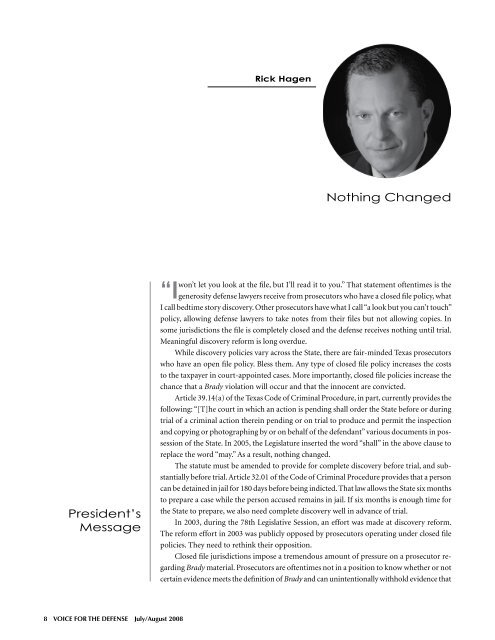for the defense - Voice For The Defense Online
for the defense - Voice For The Defense Online
for the defense - Voice For The Defense Online
You also want an ePaper? Increase the reach of your titles
YUMPU automatically turns print PDFs into web optimized ePapers that Google loves.
Rick Hagen<br />
Nothing Changed<br />
President’s<br />
Message<br />
“I<br />
won’t let you look at <strong>the</strong> file, but I’ll read it to you.” That statement oftentimes is <strong>the</strong><br />
generosity <strong>defense</strong> lawyers receive from prosecutors who have a closed file policy, what<br />
I call bedtime story discovery. O<strong>the</strong>r prosecutors have what I call “a look but you can’t touch”<br />
policy, allowing <strong>defense</strong> lawyers to take notes from <strong>the</strong>ir files but not allowing copies. In<br />
some jurisdictions <strong>the</strong> file is completely closed and <strong>the</strong> <strong>defense</strong> receives nothing until trial.<br />
Mean ing ful discovery re<strong>for</strong>m is long overdue.<br />
While discovery policies vary across <strong>the</strong> State, <strong>the</strong>re are fair-minded Texas prosecutors<br />
who have an open file policy. Bless <strong>the</strong>m. Any type of closed file policy increases <strong>the</strong> costs<br />
to <strong>the</strong> taxpayer in court-appointed cases. More importantly, closed file policies increase <strong>the</strong><br />
chance that a Brady violation will occur and that <strong>the</strong> innocent are convicted.<br />
Article 39.14(a) of <strong>the</strong> Texas Code of Criminal Procedure, in part, currently provides <strong>the</strong><br />
following: “[T]he court in which an action is pending shall order <strong>the</strong> State be<strong>for</strong>e or during<br />
trial of a criminal action <strong>the</strong>rein pending or on trial to produce and permit <strong>the</strong> inspection<br />
and copying or photographing by or on behalf of <strong>the</strong> defendant” various documents in posses<br />
sion of <strong>the</strong> State. In 2005, <strong>the</strong> Legislature inserted <strong>the</strong> word “shall” in <strong>the</strong> above clause to<br />
replace <strong>the</strong> word “may.” As a result, nothing changed.<br />
<strong>The</strong> statute must be amended to provide <strong>for</strong> complete discovery be<strong>for</strong>e trial, and substan<br />
tially be<strong>for</strong>e trial. Article 32.01 of <strong>the</strong> Code of Criminal Procedure provides that a person<br />
can be detained in jail <strong>for</strong> 180 days be<strong>for</strong>e being indicted. That law allows <strong>the</strong> State six months<br />
to prepare a case while <strong>the</strong> person accused remains in jail. If six months is enough time <strong>for</strong><br />
<strong>the</strong> State to prepare, we also need complete discovery well in advance of trial.<br />
In 2003, during <strong>the</strong> 78th Legislative Session, an ef<strong>for</strong>t was made at discovery re<strong>for</strong>m.<br />
<strong>The</strong> re<strong>for</strong>m ef<strong>for</strong>t in 2003 was publicly opposed by prosecutors operating under closed file<br />
policies. <strong>The</strong>y need to rethink <strong>the</strong>ir opposition.<br />
Closed file jurisdictions impose a tremendous amount of pressure on a prosecutor regard<br />
ing Brady material. Prosecutors are oftentimes not in a position to know whe<strong>the</strong>r or not<br />
certain evidence meets <strong>the</strong> definition of Brady and can unintentionally withhold evidence that<br />
8 VOICE FOR THE DEFENSE July/August 2008

















